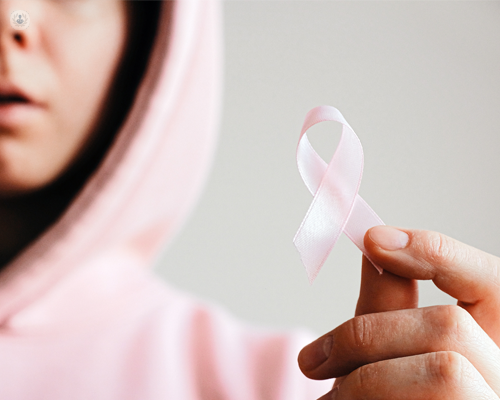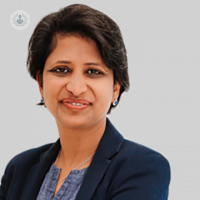Dealing with a breast cancer diagnosis
Written by:Being diagnosed with breast cancer is a life-changing event that affects about 1 in 8 women in their lifetime in the UK. Thankfully, there is a lot of treatment options and support that woman can avail of during this challenging time. Professor P.G. Roy, Consultant oncoplastic breast surgeon in Oxford, takes the time to detail what a patient can do to help remain calm and give themselves a better chance of a quick recovery, and where they can find additional support if needs be.

What happens after a breast cancer diagnosis?
When a patient is diagnosed with breast cancer, it is very stressful for them. Often, women feel fine and it is the last thing they expect. There are lots of questions, worries, and anxieties on their mind. They wonder how it will affect their personal lives, their children, their ability to work, and so on.
Following the diagnosis, the patient will meet the clinician or the surgeon, and a nurse specialist. This nurse specialist, also called a breast care nurse or specialist nurse, will give the patient information about their diagnosis and what their different treatment options are. The necessary information is given slowly so that the patient can think and reflect on the options to help make an informed decision regarding the treatment.
It is understandable that patients wish to get started with the treatment as soon as possible. It is important that patients wait for a minimum of one to two weeks before getting started with any treatment. This period is crucial for them to come to terms with the diagnosis, understand what it means, and know what their options are so that they can sign up for a treatment with full understanding and not rush into it, which is usually counterproductive.
What coping mechanisms help a patient stay calm after a breast cancer diagnosis?
The diagnosis affects not only the individual diagnosed but also their family. The majority of patients are women and it affects everyone whose life she touches. Taking time is key to understanding the diagnosis and the treatment options. Patients shouldn’t be scared of asking questions to get the relevant information. It is advisable to avoid going on the internet for answers, but if a patient does, they should look for information from reliable sources that are based on science and presented in a simple and sensitive manner (the treating team will often provide leaflets or signpost you to reliable source online).
How can family and friends support women with a new breast cancer diagnosis?
A patient’s friends and family can help the individual during this difficult period by being present during consultations, helping them to understand their treatment options, and providing emotional support. However, they should avoid pushing their own views onto the patient. The patient needs the support to be able to decide on a treatment plan themselves as per the guidance from the hospital team.
What can a patient do while waiting for the treatment to start?
Look after their psychological well-being along with physical well-being. Patients can do this by eating healthily, getting regular exercise, and making sure they sleep for 7-8 hours, whatever is normal for them. If the patient is struggling to sleep, they can ask their GP for some mild sedatives. Patients need to look after themselves so that clinicians can look after them.
There is scientific evidence that suggests that if you are a fit and healthy individual, your outcome is likely to be much better. Try to minimise decisions driven by your anxieties and fears. Instead, let your choice be driven by science, support, advice, and the information that is provided to you. The pros and cons of the treatment options need to be weighed up, so take time and don’t rush into any treatment without proper consideration.
What useful support groups or organisations are there?
There are several support groups and organisations, depending on the region/country the patient is in. For example, in Oxford, we have a patient support charity called Oxford Breast Buddy Group. Once diagnosed with breast cancer, the hospital teams or doctors can put you in contact with another patient who has been through the treatment. Those one-to-one conversations are more helpful in the early phase of treatment because support groups can be overwhelming and the experiences of different patients vary which may not be completely applicable to that individual patient. If at any point during the one-to-one conversation, you feel uncomfortable, it’s best to end it politely, rather than continue with it.
Once the treatment has progressed and the patient is comfortable with how things are going, they could dive into support groups. They should still be very careful and make sure they aren’t overwhelmed.
What support can people receive after their treatment?
The support groups are more helpful after clinical treatment, as the input from the hospital tends to reduce when treatment is finished. At that point, it is often useful to have a point of contact with people who are outside your immediate friends and family, to tap into their experience, and to keep yourself up to date. Additionally, it’s good to have a space where you can air your anxieties or fears and discuss them with other people after finishing the treatment.
Support or help from the medical team is usually still available if the patient has any concerns following treatment. If there are any physical concerns, the patient is likely to be referred back.
Importantly, people should strive to get back to something they love in life, e.g., a hobby, so they have a sense of getting back to normality because a return to work can often take a bit longer. Picking up something that gives them satisfaction and happiness is vital.
Patients can also use the support groups to share their journey which can be very rewarding for the patient. Sometimes I encourage patients to write blogs detailing how they coped with their treatment. The process of writing can be very cathartic and relaxing, but also their experience can resonate with other people who find it very useful to read what others are going through rather than talking to someone. Sharing is caring!
If you have recently been diagnosed with breast cancer and would like to hear more about your treatment options, a consultation with Professor P.G. Roy can be booked directly from her Top Doctor’s profile.


